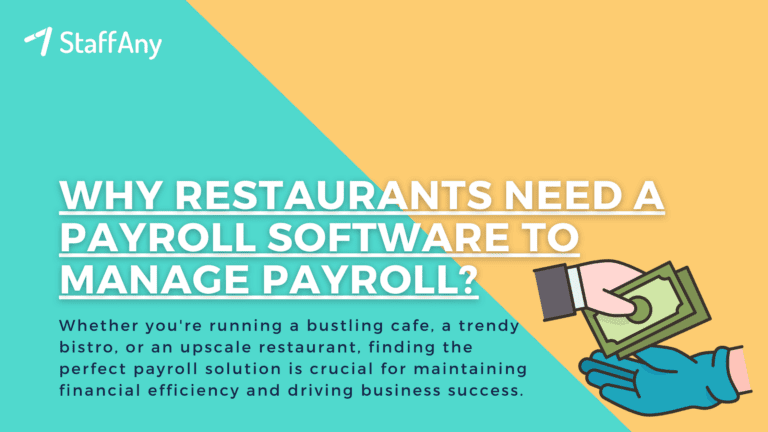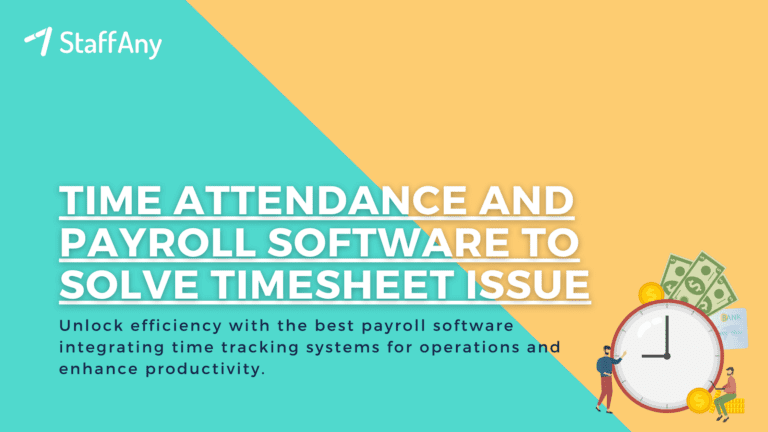Time management is an essential skill for any business, but it’s particularly important for restaurants, cafes, and other food and beverage (F&B) establishments. These businesses operate in a fast-paced, dynamic environment where every minute counts, and a lack of effective time management can result in serious consequences.
In this article, we’ll explore the importance of time management for F&B businesses, the benefits of improving your team’s time management abilities, and proven tips for restaurant time management. Let’s find out below!
The Importance of Time Management for F&B Businesses

F&B businesses rely heavily on time management to ensure that they can deliver high-quality products and services to their customers. These businesses must juggle multiple tasks, from preparing food to serving customers, managing inventory, and handling administrative tasks like accounting and payroll.
However, failing to manage time or poor time management skills can result in: missed deadlines and appointments, procrastination and lack of focus lack of professionalism, as well as inefficient workflow and low work quality.
In addition, good time management strategies are critical for maintaining a healthy work-life balance not only for F&B business owners but also employees.
Long hours and a high-stress environment can quickly lead to burnout, and effective time management can help to prevent this by ensuring that everyone has enough time to recharge and focus on other areas of their lives.
Read more: Employee Management System: Definition and Importance
Benefits of Improving Your Team’s Time Management Skills

Effective time management skills can bring numerous benefits to F&B businesses. Here are some detailed points on how improving your team’s time management abilities can help your business:
1. Increased Productivity
Time management skills enable your team to complete tasks efficiently, reducing wasted time and increasing productivity. By prioritising tasks, avoiding distractions, and delegating responsibilities, your team can get more work done in less time, which can help to increase sales and profits.
2. Improved Customer Service
Effective time management allows your team to be more responsive to customers’ needs, reducing wait times and improving overall customer satisfaction. By ensuring that orders are taken and delivered promptly, your team can create a positive dining experience for customers, which can lead to repeat business and positive reviews.
3. Reduced Costs
Good time management enables to reduce costs by avoiding waste and improving efficiency. For example, by monitoring inventory levels and ordering only what is needed, you can avoid overstocking and reduce food waste. By streamlining processes and reducing administrative tasks, you can also reduce labour costs.
4. Reduced Stress
Effective time management can help to reduce stress and increase job satisfaction among your team members. When tasks are completed efficiently, team members feel a sense of accomplishment, which can boost morale and motivation. By delegating responsibilities and empowering your team to make decisions, you can also create a more positive work environment.
5. Increased Profitability
Ultimately, good time management skills can lead to increased profitability. By reducing costs, improving productivity, and creating a positive customer experience, your business can attract more customers and generate more revenue.
Read more: Can Employee Refuse to Work Overtime in Malaysia? Here’s What You Should Know!
6. Increased Focus and Concentration
Effective time management helps leaders, entrepreneurs, and small business owners achieve their goals. When time is managed well, distractions can be minimized, and focus can be directed towards essential tasks. This enables business owners and employees to concentrate on their work, leading to higher quality outputs and better outcomes.
7. Improved Goal Attainment
Essential time management skills align daily activities with long-term goals and objectives. It ensures that time is allocated for activities that contribute directly to business growth and success. By consistently working towards goals, businesses can achieve milestones and attain success more efficiently.
8. Better Work-Life Balance
Time management allows business owners to allocate time not only for work-related activities or professional life but also for personal life and family commitments. By striking a healthy work-life balance, entrepreneurs can enjoy their personal lives, prevent burnout, and maintain overall well-being.
9. Greater Opportunities for Growth
When time is managed effectively, business owners have the bandwidth to explore new opportunities, undertake strategic initiatives, and invest time in professional development. This paves the way for business growth and expansion.
10. Improved Morale and Employee Engagement
Effective time management practices create a positive work environment. When employees have clarity about their tasks, deadlines, and priorities, they feel more engaged, motivated, and satisfied in their roles. This, in turn, boosts overall morale and productivity within the company.
In summary, time management is essential for business owners and companies as it maximizes productivity, efficiency, and overall success. By optimizing time allocation, prioritizing tasks, and fostering a productive work environment, businesses can achieve their goals, reduce stress, and thrive in today’s competitive landscape.
Read more: 11 Factors to Consider When Scheduling Staff
10 Proven Tips for Restaurant Time Management

Effective time management is essential for the success of restaurants, cafes, and other F&B businesses. Here are some tips you can use to improve your restaurant time management:
1. Create a Daily Task List
Start each day by creating a to do list for your team, outlining the most important tasks that need to be completed that day. Prioritise these tasks to ensure that the most critical items are addressed first.
2. Use Time-Tracking Software
Consider using time-tracking software to help you monitor how much time is being spent on different tasks. This can help you identify areas where productivity can be improved and adjust your team’s workload accordingly.
3. Streamline Processes
Look for ways to streamline processes in your restaurant to reduce wastage and improve efficiency. For example, consider investing in kitchen equipment that can help your team prepare food more quickly or using technology to automate administrative tasks.
4. Train Your Staff
Provide your staff with training on effective time management techniques and encourage them to share their own ideas for improving productivity. This can help to create a culture of efficiency within your restaurant and lead to ongoing improvements in performance.
5. Delegate Tasks
Delegation is key to effective time management, particularly in a fast-paced environment like a restaurant. Assign tasks to the most appropriate team members based on their skills and availability, and ensure that everyone understands their responsibilities.
Read more: A Complete Guide to Annual Leave Entitlement in Malaysia
6. Communicate Clearly
Clear communication is essential for effective time management in a restaurant. Make sure that everyone understands their roles and responsibilities, and encourage open communication between team members to ensure that tasks are being completed efficiently and effectively.
7. Set Realistic Timelines
When setting deadlines and timelines for tasks, be sure to factor in realistic estimates of how long each task will take. This can help to avoid overloading your team and ensure that they have enough time to complete each task to a high standard.
8. Monitor Inventory
Effective inventory management is key to ensuring that your restaurant has enough supplies to meet demand without wasting money on excess stock. Regularly monitor inventory levels and adjust orders accordingly to avoid running out of key ingredients or overstocking items that are not selling well.
Read more: Getting to Know Rotational Shift Meaning and Its Benefits for F&B Businesses
9. Embrace Technology
Technology can be a powerful tool for improving time management in restaurants. Consider using software to automate repetitive administrative tasks like accounting and payroll or investing in a point-of-sale system that can help your team process orders more quickly and accurately.
10. Take Breaks
Last but not least, it’s important to remember that taking breaks is essential for maintaining productivity and avoiding burnout. Encourage your team to take regular breaks throughout the day to recharge and refocus.
Are you looking for an easy-to-use roster-making app to help improve your restaurant or F&B business’s time management? Look no further than StaffAny! Our app is designed to simplify employee scheduling, streamline communication, and improve overall efficiency.
With features like an onsite time clock, real-time report, and payroll integration, StaffAny is the ultimate solution for your time management needs. Sign up today to see how StaffAny can transform your business!











